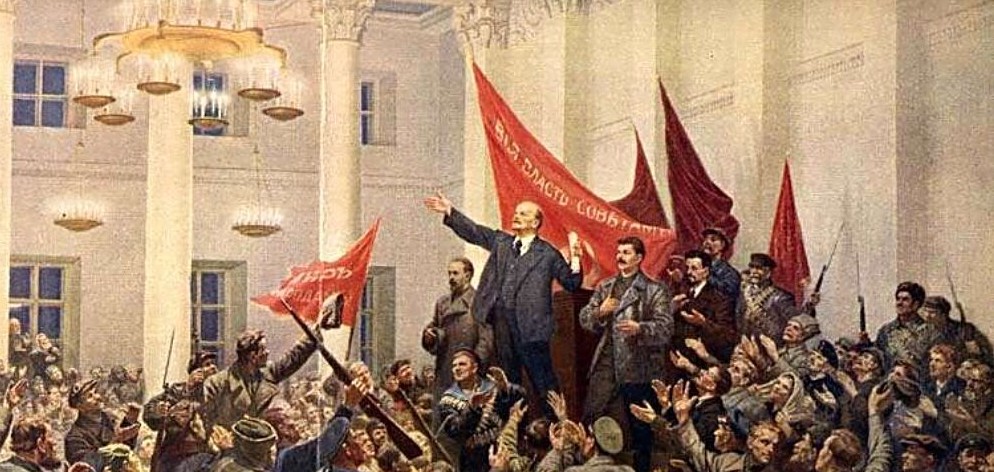
Vladimir Ilyich Ulyanov, known to us as Lenin, was born 150 years ago on the 22nd of April. His effect on history, on revolutionary thought and on the minds of the people of this world, all remain possibly unparalleled by any figure of the tumultuous 20th century. One of the ways in which Lenin remained immortalised was by the admiration displayed for him by various artists around the world, especially writers. Lenin remains, as Marcel Liebman once wrote, a figure which nearly every insurrectionary movement claims as their heritage.
The Communist movement was, and remains a source of inspiration to artists, especially those with a sense of social welfare and a concern for the oppressed of the world. Lenin himself, having played an outsized role in this movement, was depicted by various leading poets, which I want to discuss and present here. This is not an exhaustive list– a testament to just how many people were inspired to write about Lenin, but a collection from some of the best known names in world poetry. These particular poems were written in the period between the 1920s and the 1960s, an era where world socialism was undoubtedly on the ascendant, and the memory of the Russian Revolution and Lenin was very much still imprinted in people’s minds. They also reflect the range of admirers of Lenin, across nationalities, languages, even politics (although mostly broadly sympathetic towards the Left).
The first poem here was written by the great African-American poet Langston Hughes. Hughes is most prominently known as a leader of the Harlem Renaissance, and his involvement in the Civil-Rights movement and his work and lifelong commitment to the struggles of Black people in America. Hughes was never explicitly a Communist, unlike some of the other writers here. However, in 1932, Hughes travelled to the Soviet Union as part of a group of 22 young Afro-Americans to take part in a film about Afro-American life in the U.S. His experiences led him to write several poems pertaining to the subject, and two for Lenin.
The first was called “Ballads of Lenin”, and a stanza is reproduced here:
Comrade Lenin of Russia,
Alive in a marble tomb,
Move over, Comrade Lenin,
And make me room.
I am Chico, the Negro,
Cutting cane in the sun.
I lived for you, Comrade Lenin.
Now my work is done.
The second is a poem, reproduced in full, is an even more explicit exaltation of what Lenin meant to people engaged in revolutionary struggles around the world.
Lenin walks around the world.
Frontiers cannot bar him.
Neither barracks nor barricades impede.
Nor does barbed wire scar him.
Lenin walks around the world.
Black, brown, and white receive him.
Language is no barrier.
The strangest tongues believe him.
Lenin walks around the world.
The sun sets like a scar.
Between the darkness and the dawn
There rises a red star.
The next poem is one in a cycle of poems written for Lenin by Vladimir Mayakovsky, who Stalin once described as the “best and the most talented poet of our Soviet epoch”. Mayakovsky wrote his first poem for Lenin around a 100 years ago, on the occasion of Lenin’s 50th birthday in 1920. The last poem in this series was written after the death of Lenin. Mayakovsky was remembered to have taken his death very personally, and had always identified very closely with the leader of the Soviet movement himself.
The last and most epic poem itself stretches for 3,000 lines over 86 pages, dedicated to the Russian Communist Party.
The following lines are excerpted here from his epic poem Lenin itself, written in 1924:
Composed in Mayakovsky’s distinct style, developed with his experimental approach to the lyrical form:
The time has come.
I begin thestory of Lenin.
Not
because of grief
is on the wane,
but because
the shock of the first moment
has becomea clear-cut,
weighted and fathomed pain.All Moscow’s
frozen through,
yet the earth quakes with emotion.
Frostbite
drives its victims
to the fires.
Who is he?
Where from?
Why this commotion?
Why such honours
when a single man expires?
Dragging word by word
from memory’s coffers
won’t suit either meor you who read.
Yet what a meagre choice
the dictionary offers!
Where to get
the very words we need?
We’veseven days
to spend,
twelve hours
for diverse uses.
Life must begin–and end.
Death won’t accept
excuses.
But if
it’s no more
a matter of hours,
if the calendar measurefalls short,
“Epoch”is a usual
comment of ours,
“Era” or something
of the sort.
We
sleep
at night,
busy
around
by day,
each grinds his water
in his own pet mortarand so
fritters life away.
But if,single-handed,
somebody can
turn the tide
to everyone’s profit
we utter
something like
“Superman”,
“Genius” or “Prophet”.Words–
even the finest–
turn into litter,
wearing threadbare
with use and barter.
Today
I want to infuse
new glitter
into the most glorious of words:
PARTY.
Individual–
what can he mean
in life?
Over the world-wide forest
of factory stacks
like a giant banner
the huge
Red Square,
millions of hands
welded into its staff,
soars
with a mighty sweep
into the air.
Vladimir Ilyich Lenin.
There are also a whole host of poems written in Urdu in honour of Lenin, wonderfully surveyed in Raza Naeem’s recent article for The Wire in honour of Lenin’s 150th. I take from him perhaps the most well-known poem on Lenin in Urdu, by none other than Allama Iqbal.
Allama Iqbal, was of course, a renowned poet, barrister and freedom fighter and thinker and theorist of the idea of what was to later become the state of Pakistan. The poem is imagined as a conversation between God and Lenin, about the state of humanity today.
The third and final section of Iqbal’s poem, translated here is:
Go bid the wretched of my earth to awake
The foundations of elite palaces should quakeRoil the blood of slaves with the pain of belief
Sparrows should challenge eagles, make no mistakeThe moment of democracy is at hand
Signs of the old order I bid thee to breakBurn every ear of wheat of that field from which
The farmer is not permitted to partakeDistance between God and humans is futile
Remove the bishops from the church; they are fakeBuild me a simple house with sand, for I hate
Those marble edifices.The new world is but a brittle glass palace
Poet of the East, learn obsession and heartache.
The next poet to write prolifically in praise of Lenin was the German playwright Bertolt Brecht. Brecht is of course recognised as one of the pre-eminent dramatists of the 20th century, and was a committed Communist his whole life, inspired by the events of the Russian Revolution, and lived in Exile from Germany, escaping Nazi rule, while eventually returning to the erstwhile DDR after the war to establish the Berliner Ensemble.
The most famous poem written by Brecht on Lenin was titled ‘Cantata on the Day of Lenin’s Death’, excerpted below:
1
The day Lenin passed away
A soldier of the death watch, so runs the story, told his comrades: I did not want to
Believe it. I went inside, and
Shouted in his ear: ‘Ilyich
The exploiters are on their way!’ He did not move. Now
I knew that he has expired.9
When Lenin passed away and was missed
The victory had been won, but the land lay waste
The masses had set out, but
The way was dark
As Lenin passed away
Soldiers, sitting on the footpaths, wept
And the workers went away from their machines
And clenched their fists.10
As Lenin went, it was
As if the tree said to its leaves
I am off.12
Lenin is enshrined
Cantata on the Day of Lenin’s Death, Bertolt Brecht
In the large heart of the working-class,
He was our teacher.
He carried on the struggle along with us.
He is enshrined
In the large heart of the working class.
The poem was put to music by Hanns Eisler, the great Austrian composer, famously persecuted by the House Un-American Activities Committee for his links (which he always wore proudly) to the Communist movement.
Another poem by Brecht, for Lenin, is titled the Hole in Lenin’s Shoes, written in 1935:
You, who are sculpting a statue of Ilyich
Twenty metres high, at the Palace of the Trades Unions
Do not forget that in his boot
There was the hole, attested by many, a sign of poverty.
I hear to be sure, he faces
The West, where many live, who in the hole in the boot
Will recognise Ilyich as
One of their own.
Brecht had another poem pertaining to Lenin, titled The Unconquerable Inscription. The poem recalls an apocryphal story in an Italian prison, where the name of Lenin appeared on the prison walls, and every time the prison authorities would expurgate it, it would reappear the next night written in more durable materiel. Eventually, the poem and story end with this:
But deeply carved, stood the unconquerable inscription:
Long live Lenin!
Now, said the soldier, get rid of the wall!
The last poet whose work I will mention is the Chilean poet and Nobel laureate Pablo Neruda (the greatest poet of the 20th century, according to none other than Gabriel Garcia Marquez). Neruda was a committed communist and even served in Parliament for the Chilean Communist Party. He constantly expressed his views and admiration for revolutionaries and the socialist movement in his poems, with odes written to Fidel, Simon Bolivar, and the constant depiction of the lives of ordinary people.
He wrote an Ode to Lenin in 1959, excerpted here:
I
Lenin, to sing to you
I must say farewell to words:
I must write with trees, with wheels,
with plows, with cereals.
You’re concrete
as facts and earth.
There never was
a more earthly man
than V. Ulyanov.
There are other imposing men
who like churches are used to
conversing with the clouds,
they are tall, solitary men.
Lenin made a pact with the earth.
He came from farther away than anyone,
People,
rivers, hills,
steppes,
were an open book,
and he read,
read farther than anyone,
clearer than anyone.
He looked deeply
into the people,
admired them like a well,
examined them as
they were an unknown mineral
he had discovered.
Water needed to be taken from the well,
the dynamic light needed to be elevated,
the secret treasure
of the people,
so everything germinated and hatched
to be worthy of time and earth.IV
Some men were only good for studying,
deep book, passionate science,
and other men had
as their virtue the soul of the movement.
Lenin had two wings:
wisdom and the movement.
He created by means of thought,
deciphered enigmas,
went on breaking the masks
of truth and man
and was everywhere,
was simultaneously in all places.
All the poets above are distinct in their praises to Lenin. Mayakovsky’s style, Brecht’s witticisms, Neruda’s earnestness in writing, Hughes’ experiences as an African-American, and Iqbal’s words as a colonial subject characterise their poetry in general, as well as reflected here in the crystallised form of these poems. However, as they all emphasise, the legacy of Lenin lies in the very fact that these seemingly unconnected people around the world felt the same connection to his life’s work and actions.
To end with the last stanza from Neruda’s ode to Lenin:
Thank you, Lenin,
for the energy and the teachings,
thank you for the firmness,
thank you for the Leningrad and the steppes.…
Thank you, Lenin,
for the hope.
Madhav Ramachandran



